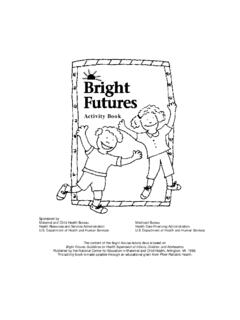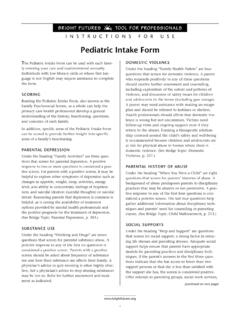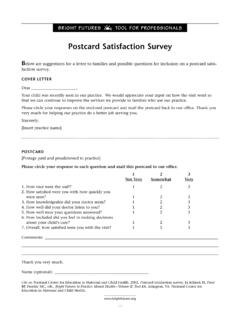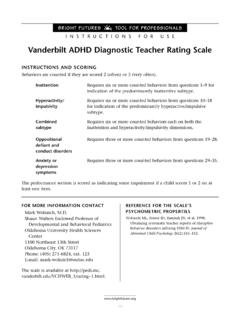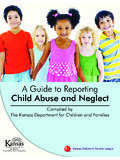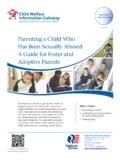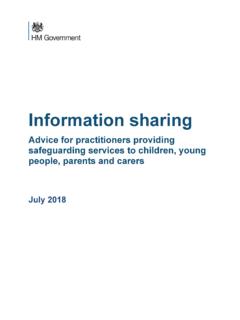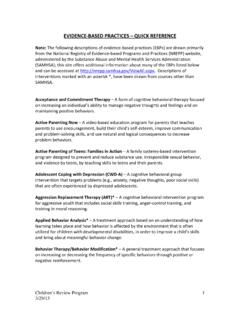Transcription of EARLY ADOLESCENCE • 11–14 YEARS - Bright Futures
1 Questions for the Parent(s) Physical Development and Health Habits What makes you proud of Angela? What do you do to stay healthy? EARLY ADOLESCENCE 11 14 YEARS . How have things changed now that Angela is becom- What changes have you noticed in your body in the ing a teenager? past 6 months? What questions/concerns do you have about her? Have you started having wet dreams? Started your ( , weight, substance use, friends, sexual activity.) period? Is it regular? How is Angela doing in school? What does she do How do you feel about the way you look? after school? What do you usually eat for breakfast? For lunch? What has Matt been taught in school or at home How often do you eat meals with your family?
2 About drugs, sex, and other health topics? Do you ever fast, vomit, or take laxatives or diet pills Do you supervise Matt's social and recreational activi- to control your weight? ties? How do you check for alcohol or drug use? What physical activities do you participate in? Ever been injured playing sports? Ever been encouraged to Questions for the Adolescent play hurt ? Social and Emotional Development How often have you smoked or chewed tobacco in What do you do for fun? What is your favorite activity? the past month? Who is your best friend? What do you do together? How often did you drink alcohol, use inhalants, or What are some things that make you sad? Angry? use drugs in the past month?
3 Which drugs? Worried? Who do you talk to about them? Do your friends try to pressure you to do things you What do you do when you feel really down or don't want to do? How do you handle that? depressed? Have you ever thought about hurting How often do you wear a safety belt in the car? Use a or killing yourself? bike helmet when bike riding? Have you been in a fight in the past year? Have you ever carried a weapon? 38. Relationships and Sexuality Exam and Screening Have you started dating or going out with anyone? Exam: Measure and plot height, weight, and BMI-for-age EARLY ADOLESCENCE 11 14 YEARS . What questions/concerns do you have about sex? on CDC growth chart. Note Sexual Maturity Rating.
4 Have you ever had sex? Are you having sex now? Do scoliosis or kyphosis (screen annually); possible you use condoms? neglect/ abuse ; eating disorders; sports injuries, ortho- Has anyone ever touched you in a way you didn't pedic problems; teeth; acne; tattoos, piercing. like? Forced you to have sex? Females: Examine genitals; check for condyloma/. Have you had any sexually transmitted diseases (STDs)? lesions, vulvovaginitis. Ever had sexual contact with someone with an STD? Males: Examine genitals; check for varicoceles, hernias, condyloma/lesions, testicular cancer (risk factors: his- Family Functioning tory of undescended testes, single testicle). Evaluate How do you get along with other family members?
5 For gynecomastia. Who do you live with? If adolescent lives with one Screening: Vision and hearing (age 12), blood pressure parent: When do you see your other parent? annually, anemia annually (menstruating females);. What would you change about your family if you urinalysis at least once in ADOLESCENCE . Assess emo- could? tional health (risk factors: stressors, substance use, School Performance sexual behavior, depression, history of abuse , learning How are you doing in school? Tell me about your disabilities, school problems, cruelty). grades. Risk: Assess risk of anemia, hyperlipidemia; screen as What activities are you involved in? needed. Assess tuberculosis risk; give PPD as indicated.
6 If sexually active: Annual pelvic exam and Pap smear Observation: How do adolescent and parent respond (females), STD screening (see p. 57). when health professional talks with adolescent alone? Immunizations: See schedule, pp. 51 53. Discuss Does parent seem to respect adolescent's growing possible side effects, what to do, when to call. need for confidentiality? 39. ANTICIPATORY GUIDANCE FOR THE ADOLESCENT. EARLY ADOLESCENCE 11 14 YEARS . Promotion of Healthy and Avoid loud music Oral Health Safe Habits Learn to protect self from abuse Brush teeth; floss daily Keep home and car smoke-free Mental Health Ask about fluoride, dental sealants Try to get 8 hours of sleep a night Take on new challenges to build Learn dental emergency care Engage in physical activity (30 60 confidence Schedule dental appointment minutes 3 or more times a week)
7 Learn about self, strengths Don't smoke or chew tobacco Discuss athletic conditioning, Listen to valued friends, adults weight training, fluids, weight Sexuality Talk with health professional or Identify adult who can give accu- gain/loss, supplements trusted adult if feeling sad or if rate information Limit TV, computer time things are not going right Ask health professional about Learn to manage time, activities Recognize, deal with stress puberty, sexual development, Injury and Violence Prevention Understand/meet spiritual needs contraception, STDs Use lap and shoulder belt in car Nutrition Recognize that sexual feelings are Don't drink alcohol, especially Eat three nutritious meals a day normal, but delay having sex when biking, swimming, operat- and healthy snacks Learn how to say no to sex ing machinery Eat most meals with family Practice abstinence, the safest way Limit sun, use sunscreen Limit high-fat, high-sugar foods to prevent pregnancy and STDs Use bike helmet, mouth guards, Choose fruits, vegetables; breads, If sexually active, discuss contra- protective gear cereals, other grains; lean meats, ception, practice safer sex, use Discuss home safety rules with chicken, fish.
8 Low-fat dairy products latex condoms correctly parents (visitors, emergencies) Maintain healthy weight with good Ask questions if concerned about Don't carry or use weapons eating habits, physical activity feelings for same or opposite sex Learn to swim 40. Prevention of Substance Promotion of ANTICIPATORY. Use/ abuse Responsibility GUIDANCE FOR. EARLY ADOLESCENCE 11 14 YEARS . Don't use tobacco, alcohol, drugs, Respect rights and needs of others diet pills, inhalants Share in household chores THE PARENT(S). Discuss how to resist peer pres- Take on new responsibility Spend time with adolescent sure to smoke, drink, use drugs Learn new skills (child care, CPR) Show affection, praise good If using drugs or alcohol, discuss behavior help available, seek assistance Promotion of School Model respect, family values, safe Avoid situations where drugs or Achievement driving practices, and healthy alcohol are present Discuss school transitions behaviors Become responsible for attendance, Respect adolescent's need for Promotion of Social homework, course selection privacy Competence Discuss frustrations with school, Establish realistic expectations, Enjoy family activities thoughts of dropping out clear limits, consequences Participate in social activities.
9 Participate in school activities Anticipate challenges to parental community groups, or sports Identify/pursue talents, interests authority Understand parental limits and Minimize criticism; avoid nagging, consequences for unacceptable Promotion of Community Interaction negative messages behavior Emphasize importance of school, Respect and care about peers and Ask for resources/referrals if needed Participate in volunteer, religious, show interest in school activities siblings Ask for resources/referrals if needed recreational activities Explore heritage, cultural diversity Keep guns unloaded and locked Participate in peer-mediated up, or remove from home conflict management training 41.
